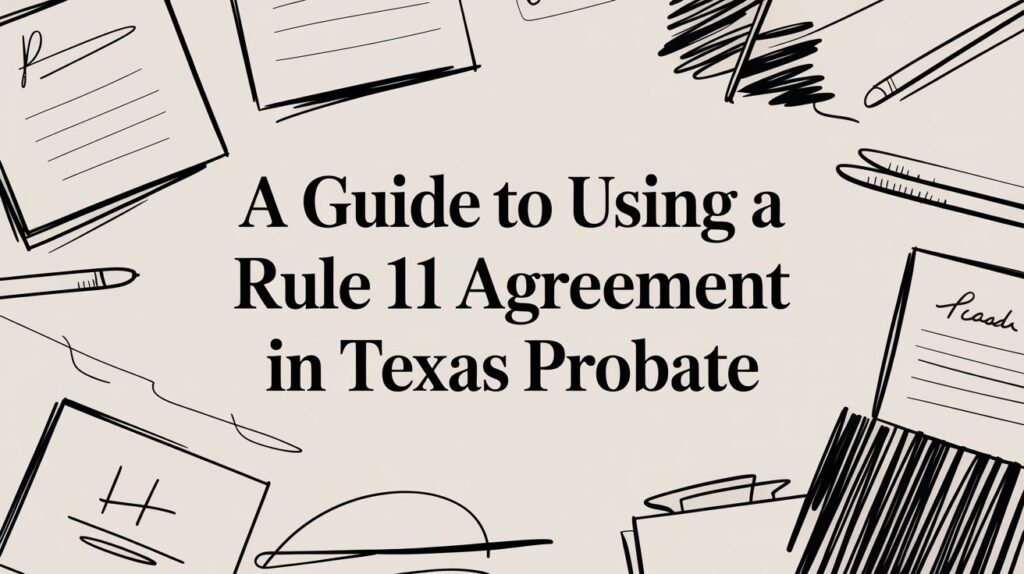When a loved one passes away, one of the first legal steps is handling the probate process. What Texas courts deal with probate matters? Understanding which court oversees probate cases is crucial for efficiently managing the estate. Whether you’re the executor or a beneficiary, knowing the appropriate court to approach helps avoid unnecessary delays and ensures the estate is administered correctly.
In this article, we will guide you through the different types of courts in Texas that deal with probate matters, what each court handles, and how to determine the right court for your specific case. Whether the estate is straightforward or involves significant assets, understanding the role of Texas courts in probate cases is vital to a smooth and effective process.
What Is Probate in Texas?
Before diving into what Texas courts deal with probate matters, it’s essential to understand the concept of probate. Probate refers to the legal process through which a deceased person’s assets are distributed, debts are settled, and taxes are paid. During probate, the will is validated (if one exists), and the court appoints a personal representative (executor or administrator) to handle the estate.
What Texas courts deal with probate matters? The answer depends on the complexity of the estate and where the deceased person lived. Several courts in Texas are authorized to handle probate cases, with different courts focusing on particular aspects of the probate process. Understanding which court to go to is crucial for ensuring the estate is handled in compliance with Texas laws.
Types of Texas Courts Handling Probate Matters
Texas has specialized courts that handle probate cases. The most common courts that deal with probate matters are probate courts, county courts, and district courts. The court’s role depends on the county, the size of the estate, and the complexity of the case.

1. Probate Courts in Texas
In Texas, probate courts are specifically designed to handle probate matters. These courts have judges with specialized knowledge of probate law and can efficiently manage estate administration. What Texas courts deal with probate matters? If a county has a probate court, it will handle cases involving the validation of wills, appointment of executors, and distribution of assets.
Probate courts typically handle:
- Will validation: The court ensures the decedent’s will is authentic and meets legal requirements.
- Appointing the executor or administrator: If the decedent named an executor in their will, the probate court appoints that person. If there’s no will, the court appoints an administrator.
- Estate administration: The probate court oversees the proper administration of the estate, including paying debts, taxes, and distributing assets.
- Dispute resolution: If family members disagree over the decedent’s will, the probate court resolves these conflicts.
For many counties in Texas, the probate court is the go-to court for all matters related to a deceased person’s estate. It ensures that the estate is settled fairly and legally, protecting the rights of all parties involved.
2. County Courts in Texas
Not every county in Texas has a dedicated probate court. In counties without probate courts, county courts take on the responsibility of handling probate matters. County courts are general jurisdiction courts, meaning they handle various types of cases, including probate cases, civil, and criminal matters.
In these counties, county courts can handle:
- Probate of wills: They accept and validate wills, just like probate courts.
- Appointment of representatives: They appoint executors or administrators to manage the estate.
- Asset distribution: They oversee the fair distribution of the deceased’s property.
- Disputes between heirs: County courts step in to resolve conflicts between beneficiaries or relatives.
However, county courts typically have less specialized knowledge of probate law compared to probate courts. This might result in delays or complications, especially in cases involving complex estates or disputes. In such instances, county courts may transfer cases to district courts for further handling.
3. District Courts in Texas
While probate and county courts handle the bulk of probate cases, district courts may step in when a case is more complex or involves significant financial stakes. What Texas courts deal with probate matters in these cases? District courts handle probate cases that involve high-value estates, contentious disputes, or complex legal issues.
District courts have jurisdiction over:
- Large estates: Estates with substantial assets, business interests, or complicated holdings.
- Contested probate cases: If heirs challenge the will’s validity or contest the distribution of assets, the district court may take on the case.
- Estate litigation: In cases involving lawsuits related to the estate, such as breach of fiduciary duty claims, the district court provides a forum for resolution.
Because district courts deal with a wider range of cases, including criminal and civil matters, they tend to have more formal procedures. These courts may be necessary for estates with complex legal questions, but they can also prolong the probate process due to the higher volume of cases they manage.
How to Determine the Right Court for Your Probate Case
Knowing what Texas courts deal with probate matters is only half the battle. The other key question is how to figure out which court is the right one for your specific case. Here are a few steps to help you navigate this process:
1. Check the Decedent’s County of Residence
The county where the decedent lived is typically where probate matters are handled. In most cases, probate is initiated in the county where the decedent resided at the time of death. If the decedent had a valid will, it must be filed with the probate court or county court in that county.
In counties with probate courts, those courts handle probate cases. If your county doesn’t have a probate court, the county court will handle the case instead. If the estate involves substantial assets or complicated legal issues, it may be transferred to a district court.

2. Evaluate the Size and Complexity of the Estate
The complexity of the estate can determine which court has jurisdiction. For small estates with relatively simple asset distributions, the county court or probate court may suffice. However, if the estate includes significant assets, such as real estate, businesses, or other valuable holdings, the case may need to be transferred to a district court. Likewise, if there are disputes over the will or estate management, a district court might become involved.

3. Consult a Probate Attorney
Probate law can be complex, and determining the right court for your case may not always be straightforward. Consulting with a probate attorney can help clarify which court should handle your case. An experienced attorney can guide you through the process and ensure that your case is filed with the appropriate court.
Attorneys can also help with navigating the intricacies of local rules, as probate procedures may vary slightly between different counties in Texas.

4. Review the Local Court Rules
Each court has its own set of local rules and procedures. Once you know which court is handling your probate case, review the court’s website or call the clerk’s office for information about specific filing requirements. Local rules can vary from county to county and may include different filing fees, document formats, or procedural timelines.
It’s essential to familiarize yourself with the local rules to avoid delays or complications in your case.

The Probate Process in Texas
Once you’ve determined the right court for your probate case, the process typically unfolds in the following steps:
- Filing the Will: If there is a will, it must be filed with the probate court for validation. The court will confirm whether the will is valid and legally binding.
- Appointing an Executor or Administrator: The court appoints someone to manage the estate. If the decedent named an executor in the will, the court will confirm this person’s appointment. If there’s no will, the court will appoint an administrator to handle the estate.
- Identifying and Paying Debts: The executor or administrator must identify the estate’s debts, notify creditors, and pay any outstanding liabilities.
- Distributing Assets: After debts and taxes are paid, the remaining assets are distributed according to the will or Texas law if there’s no will.
- Closing the Estate: Once all assets are distributed, the executor or administrator petitions the court to close the estate. The court will issue a final decree, officially ending the probate process.
Common Challenges in Probate Cases
What Texas courts deal with probate matters? While probate courts typically handle most probate cases, challenges can still arise. Some common issues include:
- Disputes over the validity of a will: Beneficiaries may contest the will, claiming it was created under duress or that it does not reflect the decedent’s true wishes.
- Family disputes: Heirs may disagree over how assets are divided or may accuse the executor of mismanagement.
- Complex estate assets: Estates involving large businesses, significant real estate, or complex financial assets may require additional time and expertise.
Conclusion
What Texas courts deal with probate matters? The answer depends on where the decedent lived, the complexity of the estate, and whether the county has a specialized probate court. Probate courts, county courts, and district courts all play crucial roles in handling different aspects of the probate process. By understanding which court is responsible for your case and consulting with an attorney, you can navigate the probate process more effectively and ensure that your loved one’s estate is managed properly.
Probate can be a complicated process, but knowing the right court to file your case in and understanding your responsibilities can make the journey easier. If you’re handling a probate case, seek legal advice and stay organized to ensure everything runs smoothly. With the right support and knowledge, you can navigate the complexities of probate and make sure that the decedent’s wishes are honored appropriately.








